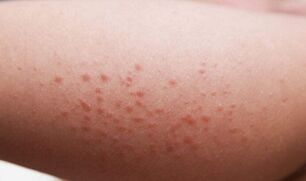
It is often difficult to determine whether there are parasites in the human body. It is almost impossible to do it yourself. Because in the first stage, you may not even understand that there is a problem with your health. And in the later stages, when real health problems begin to appear, the symptoms are usually caused by other reasons, and most of them are treated alone without in-depth understanding of the problem.
There is nothing more disgusting than the thought of worms squirming in your stomach, but some people want to swallow parasites voluntarily to lose weight or "get rid of toxins"
After reading this article, you can study the problem in more detail and learn how to determine the presence of internal parasites, that is, restore your whole body image.
What parasites may exist in the human body
Basically, there are two types of organisms that parasitize our organs: endoparasites and ectoparasites.
Endoparasites live on our bodies and other higher organisms. They live in the body and feed on the cells of organisms. Endoparasites are all worms, lambs, Toxoplasma gondii, and Echinococcus chinensis. It can be fungi, bacteria or viruses.
The second type of bacteria is ectoparasites. They live on the surface of the body, that is, in our nature, in our body. Their food is our tissues (such as skin) and blood cells. More specifically, these are parasites such as bed bugs, lice, fleas, and ticks. Mosquitoes and flies are also called ectoparasites.
How to determine the presence of internal parasites through symptoms
How to determine whether there are parasites in the body can be done both in appearance and in an internal state.
There are many symptoms related to parasites. Because these symptoms are so common, they are also symptoms of common diseases, and people usually don't even doubt whether they exist in the body. Therefore, symptoms need to be treated separately and then reappear after treatment.
It is very common to start to experience several of the following symptoms under the advice of a doctor, and to start treatment with drugs to prevent parasites. In any case, it will help you become healthier. Below, we will view the complete list of symptoms by symptom, and you will learn how to determine whether your body has parasites.
Digestive symptoms

- Constipation.Worms can be large. Therefore, they can block certain outlets of the digestive organs. Some parasites can completely seal the intestines and bile ducts. This usually affects your bowel movements. It may become rare and difficult;
- Diarrhea.It is generally accepted that diarrhea is a well-known reaction to malnutrition. But this is not always the case. Many bacteria produce hormones that affect stool in this way.
- Gas and bloating.Parasites are often found in the small intestine, which usually causes flatulence and then produces a lot of gas. If the bloating is almost constant, then consider the possible parasites in the body.
- Irritable bowel syndrome.Because parasites feed on substances in our body (such as fat), the intestinal wall is often irritated. This is followed by a certain degree of symptoms and reduction in nutrient absorption. Therefore, these substances are not absorbed, but immediately enter the large intestine, causing digestive tract problems.
Almost all parasites in the blood test increase eosinophils.
Joint and muscle pain
Parasites have specific abilities. They can live, walk through the body, and settle down in the most convenient place for the body. One of these parts is joint fluid and muscles. The symptoms are painful and usually resemble arthritis, but not always.
Parasites can severely damage muscle tissue or immunity. Therefore, their presence in the body develops into muscle pain.
External manifestations of parasites

- Allergies.Parasites constantly release toxins. With the release of a large number of special protective cells, toxins can cause great harm to the human body. They can adversely affect the body and cause allergic reactions.
- Problem skin.Parasites can not only cause allergies, but can also cause various skin ulcers, acne or pimples and other external reactions. Therefore, if you continue to have skin problems, please think twice. This will help determine the existence of the worm;
- Anemia.Many bacteria "steal" nutrients and cause blood loss. What follows is the lack of iron;
- Weight problem.It is generally believed that worms can only reduce weight, but this is a big misunderstanding because parasites can increase weight. The weight loss is always due to the fact that the worms absorb our food faster than us. Weight loss symptoms are an effective way to prove whether you have worms. But obesity is more complicated. It appears because of the low sugar content in our blood. As a result, there is an irresistible appetite, which has a negative impact on metabolism. In addition, obesity may just be the body's defensive response.
For intestinal parasites, the main symptoms are fever, nausea, vomiting, loose stools and hives/
Symptoms caused by the nervous system
- Neuroticism.Appears due to the stimulation of parasites in vital organs, even if it is minor. However, the person may not notice other symptoms. Therefore, you can determine the life of parasites based on the state of the nervous system.
- Sleep disorders.Usually, a person associates constant arousal with neurological diseases, but more often it happens elsewhere. At night, the liver starts to work, and when it removes toxic substances, our body is very active. Therefore, you may wake up during sleep.
- Grinding teeth during sleep.Certain types of bacteria can greatly irritate the body, which may cause bruxism. Moreover, this is a very common symptom. Thanks to him, you can easily learn how to recognize the presence of foreign bodies in the organs of adults or more children.
- Chronic fatigue syndrome.This symptom is an individual disease in some cases, including many other diseases. These are apathy, depression, fatigue, and decreased concentration. This is due to the fact that parasites eat a lot of nutrients and nutrients. And, of course, the body stops grasping them.

If the brain is affected by cysticercosis, neuroticism, headaches, convulsions, and pseudo-seizures will be typical.
Other symptoms
- Immune diseases.A persistent cold, runny nose, and cough may be the result of a weak immune system. And this is weakened by lack of nutrition.
- Tumor diseases.One of the most common causes of organ failure and cancer is parasites. They can sit in your organs so much that they often lead to long-term consequences-serious diseases.
- Airway inflammation.There have been talks about the movement of worms throughout the body. The other most comfortable place is the air route. Later, cough, sputum and runny nose occurred.
Conclusion
These are real symptoms of parasites. Worms can survive in your body for a long time.
It is very important to know how to check for their existence in time and prevent possible consequences.

















































